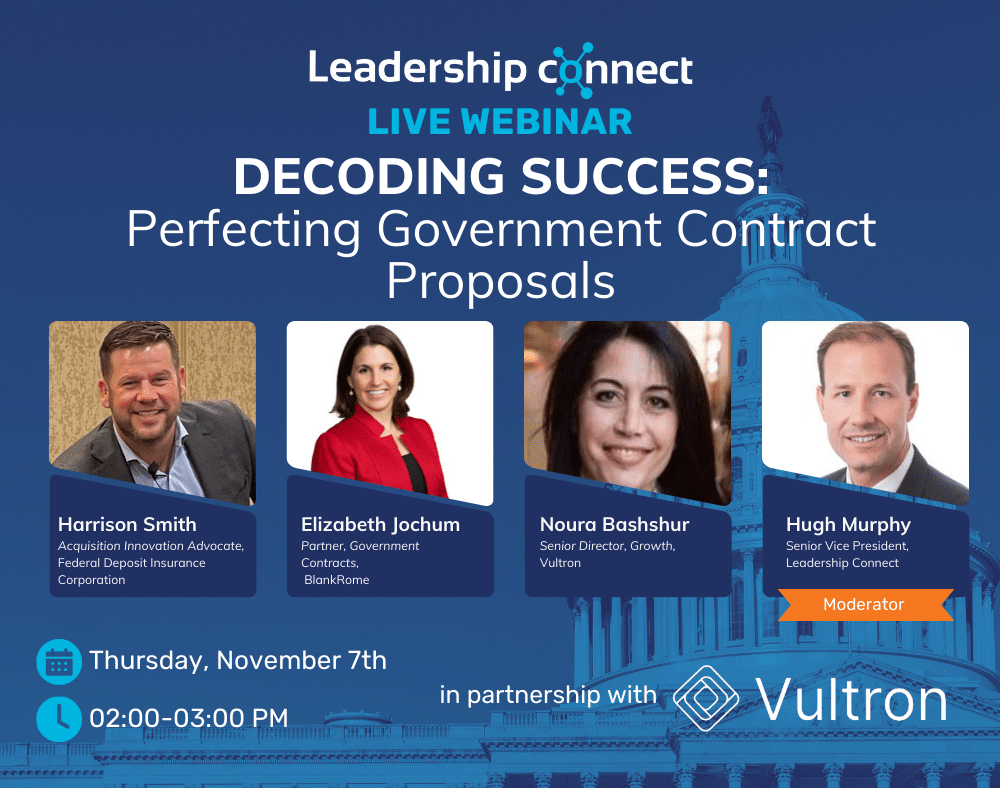On November 7, Leadership Connect and Vultron hosted a webinar focused on educating listeners on federal proposal writing and general government contracting best practices when it comes to winning agency opportunities.

The panelists explained that crafting a successful government contracting proposal requires strategy, preparation, and a keen understanding of the agency’s mission and pain points. The panel has years of experience writing and granting proposals, so our audience had a great opportunity to get an inside look into what makes an effective proposal writing strategy.
By following their best practices, you can significantly increase your chances of securing government contracts and building long-term business relationships. Check them out below! Missed the conversation? You can find the whole thing here and make sure to follow our Events Page to get in on the next conversation.
Answer the question as it is asked
- Be direct & clear: Always respond to the exact question posed in the solicitation. Logic and coherent phrasing aligned with the agency’s mission will make you stand out because agencies want to know you can meet the requirements first, and foremost.
- Meeting requirements is key: You can’t prove you’ll exceed expectations without first demonstrating that you can meet the baseline requirements.
- Follow directions: Your proposal is your sales pitch to the contracting officer. Demonstrate that you can follow instructions precisely rather than trying to over-impress.
Be prepared, clear, and intentional
- Understand their mission: Research and understand the agency’s mission. Speak their language in your proposal back to them to show a deeper level of understanding.
- Start conversations early: Engage with agencies before the RFP drops. Early conversations give you time to consult experts and ensure compliance.
- Avoid cutting corners: Cutting and pasting from previous proposals will be noticed. Take the time to prepare and tailor your responses.
- Answer questions in the right sections: Never assume an agency will cross-reference your responses. Always answer questions in the section where they are asked.
- Choose opportunities wisely: Proposal managers should be strategic about the opportunities they pursue to ensure they align with your team’s capabilities and strengths.
Leverage past performance
- Lack of experience? Leverage innovation: If the agency is looking for innovative solutions, your lack of past performance can be framed as an advantage—offering fresh, out-of-the-box solutions.
- Connect past performance to bigger goals: Government contracts often tie to broader objectives. Align your past work to show you understand these larger missions.
- Clearly explain your approach: Don’t just tell them what you’ve done, explain how and why your past experiences make you the right fit for the solution they need.
Teaming, collaboration, and partnerships
- Early engagement: Teaming with experienced firms prior to the RFP drop is a great strategy, especially if you lack past performance.
- Internal collaboration is key: Effective collaboration between BD, capture, and proposal teams is crucial for a strong proposal. Work on filling the gap and translating field knowledge and data insights with the proposal teams.
- Long-term relationships matter: Teaming is a long-term strategy. Build relationships that extend beyond the current RFP to set up future opportunities.
- Expert partnerships: Work with compliance and subject-matter experts to avoid fraud issues and ensure you meet all regulatory requirements.
Always request a debrief
- Debrief after every proposal: Always request a debrief. A debrief isn’t just about winning or losing—it’s about optimizing your future proposals and overall strategy.
- Gain actionable insights: The debrief provides direct feedback on what worked and where you can improve. Use this information to refine your approach next time.






